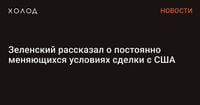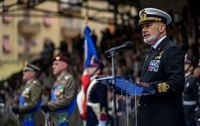In a significant development concerning international relations and military support, Ukrainian President Volodymyr Zelensky has expressed concerns regarding the changing terms of a proposed agreement with the United States on mineral resources. According to Zelensky, the U.S. has been "constantly changing" the conditions surrounding the deal, which has yet to be finalized. This statement was reported by Interfax-Ukraine.
Just prior to Zelensky's remarks, Yaroslav Zheleznyak, a deputy in the Verkhovna Rada, revealed that the U.S. had presented a draft for a perpetual agreement that would allow for revenue from the extraction of not only rare earth metals but also oil and gas, all without any security guarantees for Ukraine. Zelensky indicated that he would only travel to the U.S. once the terms of the agreement are settled, stating that there needs to be a "final version from the USA of that or another agreement."
As negotiations continue, Zelensky noted that both Ukrainian and American representatives are actively working on the agreement, as the U.S. is proposing a comprehensive deal that requires thorough examination. "America is now changing these rules and offers a complete agreement at once, and a complete agreement requires detailed study," he explained.
Importantly, any finalized agreement must receive ratification from the Ukrainian parliament. Zelensky mentioned that legal teams have cycled through various drafts, ultimately reaching a framework agreement. However, he cautioned that it is "very early to talk" about a final version. He emphasized that Ukraine is careful not to send signals that might lead the U.S. to reconsider its support or cease intelligence sharing.
In a Facebook post earlier, Zheleznyak disclosed that officials had shared a 58-page draft of the agreement, dated March 23, 2025. He noted that the document encompasses all mineral resources across Ukraine, both new and existing. The proposed deal includes the establishment of a fund managed by five individuals—two from Ukraine and three from the U.S.—with veto power over any changes. However, Zheleznyak lamented that there are no provisions for security guarantees for Ukraine in the draft, describing the proposal as tantamount to "colonial dependence" or reparations from a victim of aggression, stating, "Because otherwise, I will not give weapons, intelligence and you will be captured by the aggressor."
Meanwhile, discussions regarding the deployment of European troops in Ukraine have also intensified. NATO has outlined three conditions for any potential introduction of these forces. European leaders are currently negotiating the terms, which could be beneficial under specific circumstances. According to NATO officials, a complete ceasefire must be established and adhered to by both parties involved. Furthermore, a robust mandate, preferably under the auspices of the United Nations, is essential.
Additionally, the force deployed should be an authoritative, multinational one, comprising not only European troops but also sufficient personnel to ensure a substantial presence along the entire Russian-Ukrainian border. The main guarantee of security for Ukraine, according to NATO, will continue to be its Armed Forces, which have demonstrated remarkable resilience and effectiveness over three years of conflict.
As the war continues, Ukraine is expected to receive ongoing assistance from various countries, including arms supplies, training, and support for interoperability. This aid is critical for restoring capabilities that have been depleted by the ongoing conflict and for reorganizing its military to provide necessary deterrence against future aggression.
Looking ahead, NATO emphasizes the need for a stable peace post-war. Officials have warned against allowing Russia to exploit any ceasefire for regrouping, insisting that the nation should never attempt to seize even a single square centimeter of Ukrainian land again. "This is why NATO allies are providing Ukraine with such significant support. It is crucial not only for the security of Ukraine but also for the security of all of Europe and the world," stated a NATO representative.
The discussions around troop deployment were highlighted during a recent meeting in Paris on March 27, 2025, which included Ukrainian President Zelensky and other European leaders. French President Emmanuel Macron proposed the idea of sending "support forces" to Ukraine, suggesting that these troops should be strategically placed rather than positioned directly on the front lines.
As the situation develops, both the negotiations with the U.S. regarding mineral resources and the potential deployment of European troops will play critical roles in shaping Ukraine's future security landscape. The stakes are high, with implications not just for Ukraine but for broader European and global stability.





